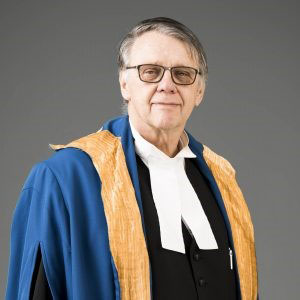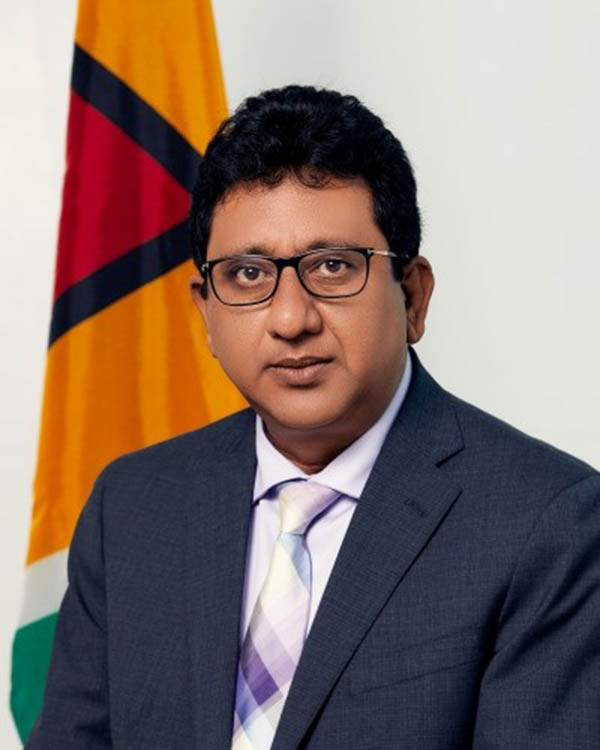The Caribbean Court of Justice (CCJ) yesterday issued a stern reprimand to Attorney General Anil Nandlall SC over the premature release of its findings in the appeal by the Opposition APNU+AFC against the throwing out of its election petition. (See other story on page 2.)
Emphatically registering its displeasure with Nandlall’s conduct which it described as “unacceptable” and capable of bringing the court’s integrity into disrepute, the judges who heard the appeal were visibly incensed about the leak.
Justice Jacob Wit on behalf of the Bench ordered Nandlall who was absent from the hearing, to publicly apologize via his Facebook page, where the post had been made, noting that “we don’t take this lightly at all.”

While Solicitor General Nigel Hawke offered an unreserved apology on behalf of the AG who he said asked to be excused as he was travelling in Barbados on official government business, Nandlal himself, following yesterday’s hearing accepted responsibility.
The AG said he was sorry, but before doing so, provided the explanation that while the post did appear on his page, the slip-up was not actually his, but rather “an administrator of my Facebook page.”
That person who the Attorney General sought to explain is really to be blamed “unauthorisedly, made a post which disclosed some contents of an advanced confidential copy of the judgment” he said.
Following the post on Nandlall’s Facebook page on Tuesday which saw many questions being asked on social media about the outcome of the Court’s decision which was set to be delivered not until yesterday, the post was immediately removed.
After removing that post, Nandlall then in another post which seemed to have also since been removed, acknowledged that the copies of the ruling sent were confidential and had been transmitted to all attorneys in the matter.
He did not at that time say that the post which appeared on his page was an unauthorized one, made by an administrator; or that he was sorry for the leak on behalf of that person. Each attorney had been privately emailed form the court regarding the outcome of the matter. Nandlall did not say how the administrator had gotten hold of the decision which had been sent to him.
Following the directive from the Court, the AG yesterday did, however, eventually end his post by saying “I hereby offer to the CCJ my sincerest apologies for this grave error. Absolutely no disrespect or ill-motive inspired, was intended, or was connected with this post.”
Review
The CCJ has said that it may have to review its policy regarding the confidential release of rulings to attorneys, perhaps especially those in Guyana, as trust seems to be compromised even as it emphasized the importance of its integrity not being brought into disrepute.
Hawke who faced the music for the absent AG offered his unreserved apology and after the Court’s call for the public apology, said that Nandlall would have no reservation undertaking to personally and publicly apologize to the Court,
Hawke begged for “forgiveness and mercy and grace” over what he said was an error which he acknowledged can bring the Court’s reputation into disrepute.
Attorney Selwyn Pieters—one of the attorneys for the petitioners—had said that an apology from the AG would be neither sufficient nor accepted, especially since the post was widely shared on social media and placed the administration of justice into disrepute and does not place the Court itself in a positive light.
He said that while he appreciates Hawke’s apology, the page belongs to the Attorney General and as the chief law officer and leader of the bar, what transpired was unacceptable.
Describing the leak as a “grave” and “serious” breach of its confidentiality protocol which allows for electronic copies of rulings to be privately emailed to all attorneys in every matter before it, the Court pitched the idea that the policy in relation to Guyana may have to be reviewed.
Justice Wit explained that those advance copies which are provided to counsel constitute a custom and service of the Court. Given the confidentiality protocol in place, however, absolutely no aspect of the contents of those judgments is ever to be made public before the Court actually delivers its ruling.
The Court said that the last has not yet been heard on the issue of Nandlall’s breach of its confidentiality clause which allows for written judgments in all cases to be sent to all counsel before the oral delivery.





